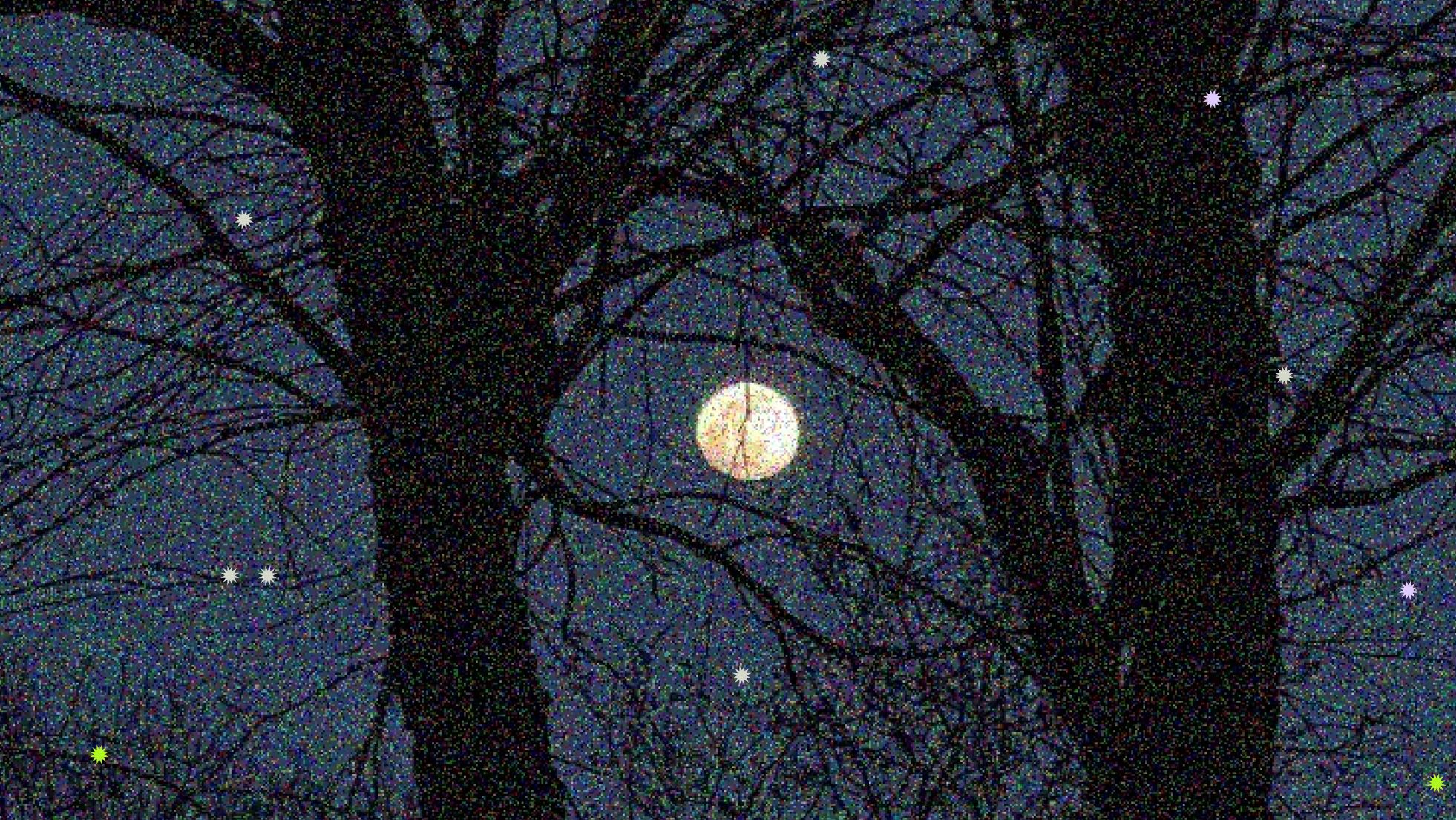
What can we learn by reframing our darkest moments?
This is the inaugural send of Dark Properties, a new editorial project that explores personal and planetary ecologies as a way to reframe our shared future(s). Subscribe here.
What follows is a rather intimate essay about my chronic insomnia, which indirectly helped me to ideate this project, and which—more poignantly—taught me to make more space for darkness in my life. Note that most sends won’t be this personal, and will be more focused on actual ecosystems.
Last note: If you also struggle with sleep, I’ve included a few resources and tips at the very bottom. Thanks for reading. <3
— Willa

I’ve had trouble sleeping at various points throughout my life. I’m guessing many of you reading this have, too—it’s quite common. Over the years I’ve tried to “fix” this problem in many ways, and as a perfectionist and an optimizer, sleep has often felt like the one thing in my life where the harder I try, the worse I am at it.
While my sleepless nights never seem to derail my days or overall life in the awful ways I imagine, I still dread the feeling of being wide awake in the dark. Over time, I’ve come to wonder: Why do I fear wakefulness? What if I could fully embrace the darkness?
✺
My first run-in with insomnia happened at a sleepover party, probably around the age of 9 or 10. I remember roaming my friend’s darkened house long after everyone else had fallen asleep, padding into the kitchen and catching a glimpse of their microwave clock: 2am. I had never been awake at that time before. It registered as a first then, simply due to the novelty of the hour, but looking back it was also my first peek into something I’m now quite familiar with: the sleepless void.
At this point I’m a long-time traveler in this liminal space. During insomnia nights, the dark tends to unfold into a parallel-seeming universe, like I’ve astral-projected myself into an upside-down, deserted and inverted version of reality where all kinds of dreams and fears stretch out like long, hazy shadows. The sleepless void is a place that is both nothing and everything. It contains my entire mind, and in that way the entire world—but it’s also completely dark, completely still. It encapsulates an odd oscillation between realms, where the most pulsing symptom of life—my own pounding heartbeat—ticks away the time more scornfully than any clock I’ve ever known.
During the pandemic’s worst months, as the 2020 election loomed, my penchant for fitful sleep developed into a more full-blown case of insomnia. Then, about a year later, it got worse again when my partner and I decided to try to have a kid. It was then that I realized that my sleeplessness was triggered when I felt scared, and when my desire to control my own life felt impossible. Once I became pregnant and the days and weeks passed in a blur of hormonal exhaustion, often my insomnia faded out. But it was always lurking in my subconscious, threatening to come back.
When I eventually gave birth and we had a sweet agent of chaos keeping the lights on from dusk ‘til dawn, my insomnia finally did its worst to me. Between the night feedings and the overwhelming stress of new motherhood, some nights I wouldn’t sleep at all. I wasn’t sure who to blame: myself, our infant son, or the never-ending January days that seemed relentlessly dark. I often felt like my inability to sleep was “ruining” this special time, and that sense of personal failure left me wracked with guilt. Since I knew there was nothing medically “wrong” with me, I thought I should be able to snap out of it. But I couldn’t. Being exasperatedly awake was my new normal.
✺
As that long winter slowly faded into spring, bit by bit, I began to make my own kind of peace with sleeplessness. As hard as it was—and as tired and rundown as I felt—I realized I was not being destroyed by the darkness. At some point a flip switched, and I gave up on seeing sleep as a problem to be solved. I decided that it was better to be tired and awake than to live in fear of not sleeping; better to use my problem as a catalyst for inquiry and care than to run from it.
There’s that saying that the only way out is through, and for this that rings true. Sometimes fighting a problem head-on only makes it worse, and we need to go deeper—to truly dissolve ourselves in our fears, our grief—to fully face what ails us. To heal.
Learning to live with my insomnia hasn’t been enjoyable, but in many ways it’s been enlightening, even empowering. Acceptance hasn’t felt like giving up, either. Instead it’s felt like a kind of micro-liberation, where failing to sleep is no longer a capital-F Failure, but rather a nudge towards realignment.
These days when I can’t sleep, I read books—books about time, about plants, about consciousness, about the environment, about the future. Sometimes I light a candle or play quiet music, sometimes I write little notes to myself, or stretch my body, or think about ways to expand my garden; my world; myself. In this way, I’ve found that the night can be a fruitful time, full of flickering ideas and otherworldly impulses.

Being alert in the night has given me an outlook that feels useful as we collectively face the hard road ahead. Suffering, however small when compared to the ache of the larger world, teaches resilience. Anyone who’s experienced a dark time and emerged on the other side knows this: Life, with all its fallow periods and challenges, is flexible. And: We’re tougher than we think.
In Katherine May’s book, Wintering, she offers relevant wisdom around weathering life’s dark periods. She even considers the possibility that difficult times may make us more wakeful as a way to push us into a quieter, more brooding space:
We have lost our true instincts for darkness, its invitation to spend some time in the proximity of our dreams. Our personal winters are so often accompanied by insomnia: perhaps we’re drawn towards that unique space of intimacy and contemplation, darkness and silence, without really knowing what we’re seeking. Perhaps, after all, we are being urged towards our own comfort.
Katherine May’s words inspire me to expand my perspective to everyone else who might feel overly awake at a time when so many seem to sleep—literally and metaphorically.
Right now, there’s so much at stake, and so much that feels wildly beyond our control. But being alive on the cusp of everything shifting and degrading means understanding that the dark night is long, so we must find ways to make space for life inside of this reality.
✶
One early morning after a particularly long insomnia night, the idea for this project stewed in my head. I was mulling over the phrase “possibility in the dark,” and feeling overwhelmingly compelled. As a creative rush of energy flooded my body, I felt an inkling of gratitude for my sleeplessness. It had, in some oblique way, energized me.
As with doing the personal work necessary to reframe my insomnia—which will likely be a life-long process for me—I am motivated to learn from others who are on a life-long quest to transfigure dark times into something lighter, something brighter. That’s why I keep coming back to the idea of a “quest,” defined as “a long or arduous search for something.” I’m not looking for a silver lining within the gloom of our world’s multifaceted deterioration, but rather seeking out a shimmer of possibility; the ghostly allure of something just out of reach, but definitely there.
Right now I think we are all groping around for what comes next, and while it can feel scary, it’s also exciting. I’m compelled to share Rebecca Solnit’s words from Hope in the Dark:
Inside the word emergency is emerge; from an emergency new things come forth. The old certainties are crumbling fast, but danger and possibility are sisters.
As Dark Properties comes to light, I hope to learn many more lessons on what can arise when we create space to rethink systems that don’t work for us—on a personal level, as I’ve attempted with sleep, but mostly on a collective and planetary level.
While reframing our world is an ongoing quest and fighting the good fight will forever be an up-hill battle, as long as the sun keeps rising every morning, the opportunities to live and create are expansive.
<3 Willa
Resources for my fellow insomniacs ✨
BOOKS:
– Radical Acceptance by Tara Brach » Everyone should read this book. It contains so much profound wisdom on self-acceptance, which really helped me to feel less bad about my sleep problem(s).
– This is NATTO by Daniel Erichsen » His approach to sleep is basically, “Be less attached to the outcome of sleeping.” The more I’ve been able to internalize his approach, the better I’ve slept.
– The Sleep Coach School Podcast, a conversation series with the same guy ^^. He interviews people who’ve recovered from insomnia and their stories are really beautiful.
TIPS:
– Never ever look at the clock, or your phone, at night.
– Know that the ideal of the 8-hour sleep cycle is largely a construct.
– Create a cozy place where you can go when you can’t sleep, away from whoever you may share a bed with. This is your new nighttime sanctuary.
– Pretend you live in an era without electricity. Go outside. Look at the stars. Wave to the moon.
– Don’t worry about the next day. You’ve been sleepless before, and survived. You’ll be fine.
– When dawn breaks, try to enjoy the sunrise <3

